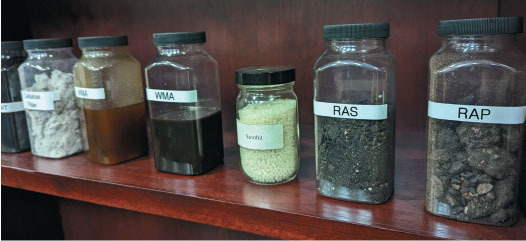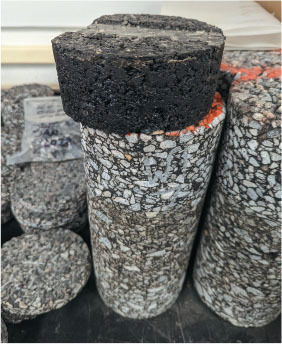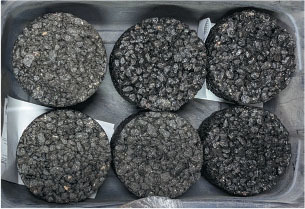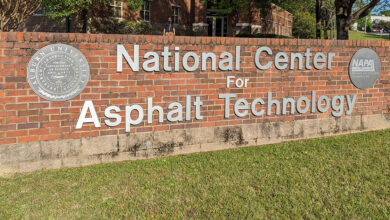Mission: Cooperative

CAPRI PUTS STAKEHOLDERS IN RESEARCH & IMPLEMENTATION DRIVER’S SEAT
National Center for Asphalt Technology (NCAT) Director Randy West said CAPRI, the Consortium for Asphalt Pavement Research & Implementation, represents a new perspective on asphalt mix research that aims to prioritize industry challenges.
“We’ve had efforts, but they’ve been not working together,” West explained. “You have the National Cooperative Highway Research Program (NCHRP), which is the states coming up with research needs. NAPA has come up with a great research roadmap of things that need to be done. And then you have researchers themselves always putting together research on this or that. What we needed to do is to bring all these groups together and in one forum to discuss what needs to be the priority, and not just what needs to be done new for research, but what we need to take from research and try to push it out into practice.”

CAPRI has nearly 50 members, with those joining representing industry and agencies. Research funding is generated by dues, which earns members a seat at the table when it’s time to direct those dollars into projects. West said the membership can steer research outcomes that can be shared through technical briefs, webinars, demonstration projects, or even inperson conferences.
“Our mission is to be a forum that engages stakeholders – all stakeholders, not just the DOTs, but also industry, material suppliers, and academia – to advance asphalt pavement technologies through development of national research needs and implementation strategies,” West said. “A lot of different ideas can be put into this implementation side to try to move the needle.”
West, CAPRI’s executive director, sits on the executive committee, which is chaired by NAPA Vice President for Engineering, Research, & Technology Richard Willis and includes representatives from the Federal Highway Administration (FHWA), state DOTs, the Asphalt Institute, Flexible Pavements of Ohio, and NAPA members like the Walbec Group and the Heritage Research Group.
West said he is happy with the current balance the group has developed between the different stakeholder groups, and said while he aims to recruit more members from across the industry, he is mindful of maintaining that balance.


“We want to keep somewhat of a balance between industry and state DOTs. It’s kind of just happened organically and it’s worked that way,” he said. “Even though we started two years ago, we’re really starting to get our wheels turning, so to speak, on what we need to be doing.”
Four subcommittees dedicated to different subject matter can make project recommendations to the executive committee, which makes decisions on research direction. The subcommittees help decide how to start the project, too, meaning members can opt to get started, issue a request for proposals, or take a direct source approach by sharing a budget and scope with potential research partners.


“The members being involved in those subcommittees is how they get to voice their preference,” Willis said.
While CAPRI is aiming to take on new challenges, the consortium is in some ways filling a void left behind by expert task groups (ETGs) that at one time advised agencies like the FHWA.
“The expert task groups that FHWA had for almost 20 years were a very effective forum to help move some research along. For example, Superpave and warm-mix asphalt both had ETGs,” Willis said.
New guidance has led to the emergence of FHWA technical feedback groups, but West said what sets CAPRI apart is that it can focus on proactive research.
“This was a hole that’s being filled. Or picture it as CAPRI taking over something that has been working good – taking over a role that was vacant,” he said. “CAPRI is really pointed at research and getting that out.”
ABOUT CAPRI
The Consortium for Asphalt Pavement Research and Implementation (CAPRI) features members from across the country who work with the National Center for Asphalt Technology (NCAT) at Auburn University to research projects, develop resources, and steer the industry adoption of new innovations. Subcommittees submit research proposals to the executive committee, which is made up of representatives from across the asphalt pavement landscape.
The executive committee includes:
Randy West, National Center for Asphalt Technology – Executive Director
Richard Willis, National Asphalt Pavement Association – Chair
Eric Biehl, Ohio Department of Transportation – Vice Chair
Michael Stanford, Colorado Department of Transportation – Treasurer
Mark Buncher, Asphalt Institute – Secretary
Griffin Sullivan, Mississippi Department of Transportation
Jason Blomberg, Missouri Department of Transportation
Katie DeCarlo, Heritage Research Group
Jon Epps, Texas A&M Transportation Institute
Katherine Erwin, Walbec Group
Jim Marszal, Flexible Pavements of Ohio
David Menching, Federal Highway Administration
Leslie Myers, Federal Highway Administration
CAPRI SUBCOMMITTEES
Advising the executive committee, CAPRI’s four subcommittees are where members plot research projects together through decisions on proposals, processes, and implementation. The four subcommittees include:
Critical Issues
Identify aspects of asphalt pavement performance and sustainability that need to be improved.
Technology Evaluation
Identify technologies that can improve asphalt pavement performance and sustainability, evaluate the readiness level of those technology levels, and recommend strategies to move those technologies toward implementation.
Technology Transfer
Identify technologies and best practices that are ready for implementation and recommend strategies to move those into practice.
Research Roadmap
Assemble recommendations of research and technology transfer needs from other CAPRI subcommittees and other sources.
JOIN CAPRI & JOIN THE CONVERSATION!
All member organizations contribute to funding CAPRI: Highway agencies contribute through the Transportation Pooled Fund Program, while all other organizations join via an agreement through Auburn University.
Learn more at CAPRIAsphalt.us


